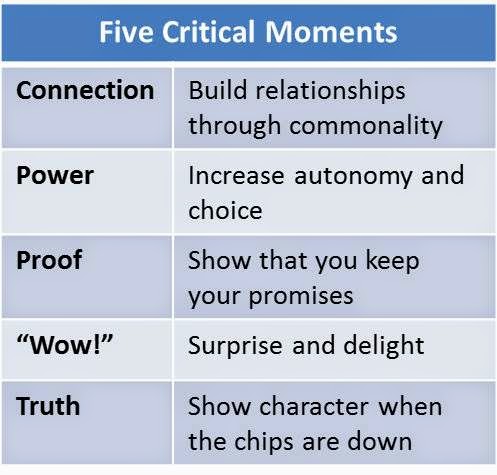Manage these situations well and customers will be yours forever.
Veteran salespeople know sales ultimately don’t come from a prospect’s logical evaluation of a product’s features, advantages and benefits. They know people make decisions based on emotions and then use logic to justify them. What matters is not what the product is but what it does and how buyers feel about it. Time and again, what makes top salespeople successful is their ability to link product benefits with the personal impact they make.
But closing the sale is just the beginning in recurring revenue businesses. Customers must remain subscribers for years before they become profitable. Like experienced salespeople, Account Managers and Customer Success professionals must go beyond software usage, good NPS® scores or satisfactory customer service to influence what makes customers loyal. They must create personal attachment throughout the subscription experience so their customers continue to renew.
Essential interactions
SaaS companies can systematically build affective bonds with their customers. It begins with knowing how the subconscious brain works, especially when it comes to subliminal needs for safety and security. When managers are attentive to the process and consistently orchestrate the following five encounters, they reduce fear and create ideal conditions for relationships to flourish. Customers are more than satisfied; they become loyal, raving fans.
1. Moments of Connection. Humans naturally seek commonality. We engage in small talk, chatting about a bad call while sitting next to a stranger at a ball game or talking about the weather on a conference call with new vendors. When we have things in common, we sense we are among friends. We subconsciously gravitate to people like us because we feel safe with them.
To create stronger connections, SaaS companies must set aside “zero touch support” and corporate façades and create warm, personal interactions early in their customer relationships. When customers feel they can relate to the people behind the brand, suddenly the company has a face. In the beginning, a friendly encounter with someone who seems familiar alleviates the customer’s subliminal anxiety. When a smart mix of personal and electronic communications follows, the relationship builds over time.
2. Moments of Power. At times we have all felt powerless and out of control. For example, nothing rattles nerves more than driving in winter and sliding on a patch of ice. That gut-wrenching feeling is a natural defense mechanism that evolved over eons. Our emotional programming helps us avoid situations that put us at risk. In day-to-day life we compensate automatically by attempting to control outcomes, making us feel safer.
SaaS companies can reduce natural anxiety by encouraging autonomy and choice. For example, customers can feel powerless learning how to use a new product. Customer Success Managers can lower tension using an onboarding process that helps customers quickly practice new skills and build proficiency. When the company allows customers options to choose from, customers also feel empowered. And as the adage goes, knowledge is power. Keeping customers informed is another easy way to soothe the psyche.
3. Moments of Proof. Our deep hunger for certainty is another natural protection from our evolutionary heritage. Subconsciously we want to know what’s going on and what happens next, once again because it’s safer. We are comforted when things go as we expect and anxious when they don’t.
SaaS companies can increase certainty in many ways, from demonstrating products to hosting quarterly business reviews to displaying system performance statistics. When the company makes promises and keeps them, expectations are met and customers become more confident. And when SaaS companies also prove that the business and personal outcomes they predicted came to fruition, they erase any remaining doubts in the customer’s mind.
4. Moments of “Wow!” We cherish times when friends and family surprise us with simple acts of kindness, appreciation and gratitude. These occasions happen infrequently, but when they do, they leave profound impressions. Like all social animals, we reflexively evaluate our status and importance relative to others. Rank ensures we maintain a greater share of resources, which in turn increases chances for our survival. When someone surprises and delights us, we feel special and cared for—we find our prestige is greater than expected.
Solving a problem meets minimum expectations, but going the extra mile on occasion makes customers feel important and desired. For example, resetting a password is a mundane task for Customer Support. But when a technician also takes a minute to check the customer’s system configuration and makes a change that speeds up system response times, the customer is thrilled. Simple acts of kindness pay substantial dividends.
5. Moments of Truth. Life occasionally involves crises. When we have no choice but to rely on others, we find ourselves in our most vulnerable psychological state. How others respond when we need them most can make or break a relationship. As they say, when the chips are down, you find out who your friends are.
In business as in life, stuff happens. Sometimes the ball gets dropped, leaving a customer with mess. Other times, issues are widespread, such as the havoc caused by a major outage or security breach. When SaaS companies use an effective service recovery process, one that restores confidence along with service, customers regain trust. How the company responds reveals character and can quickly turn around a bad situation.
Product value and quality matters, but how SaaS companies create positive emotional experiences over time ultimately tips the scale when customers consider renewing their software subscriptions. Understanding and responding to customers’ deep psychological needs is the first step to building stronger relationships and creating loyal customers.
Did you enjoy this article? Subscribe to Excel-lens now and never miss another post.
Net Promoter and NPS are registered service marks, and Net Promoter Score and Net Promoter System are service marks, of Bain & Company, Inc., Satmetrix Systems, Inc. and Fred Reichheld.


